To speak worthily about Eugenio Montale (1896 – 1981) would certainly require much more space than that allotted by a simple article. However, while not aspiring to conduct an exhaustive critical analysis, I wish to analyze just a few aspects of his poetics. In particular, I would like to emphasize the existentialist approach of some of his most famous poems.
However, before beginning the discussion, I want to make a point. All poems presented in this post have been translated from Italian by myself; therefore, they might appear not as pleasant and beautiful as they are. I strongly advise the reader to look for better translations in the book “Montale: Poems” edited by Jonathan Galassi.
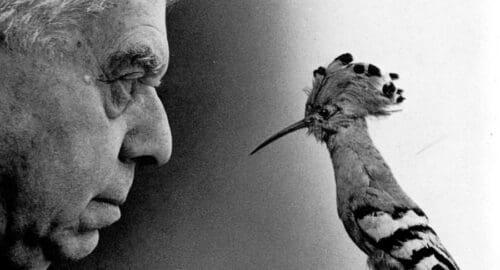
Brief introductory biographical note
Eugenio Montale was born in Genoa, Italy, in 1896. He was a renowned Italian poet and critic, widely regarded as one of the most significant literary figures of the 20th century. Montale’s poetic journey began during his studies at the University of Genoa, where he developed a deep passion for literature and writing. His early works showed his deep love for his homeland, exploring themes of nature, love, and the complexities of human existence.
However, only when Montale moved to Florence in the 1920s did his poetic voice truly flourish. Influenced by the literary movements of Symbolism and Hermeticism, he embraced a more distinctive and reflective style. Montale’s poetry is characterized by its elegant and evocative language and deep philosophical and existential undertones.
Throughout his career, Montale received numerous awards for his contributions to Italian literature, including the Nobel Prize for Literature in 1975. His poems resonate with readers worldwide, capturing the essence of the human experience in all its complexities.
Eugenio Montale’s legacy as a poetic visionary endures to this day, and his words serve as a testament to the power of language and its ability to transcend time and place. His works remain a source of inspiration for aspiring poets and literary lovers alike, and his impact on Italian culture is immeasurable.
Living: an inevitable reality cloaked in malaise
The first and most crucial philosophical element in Montale’s poetic works is the realization that life is not a process that man undergoes (as, according to Heidegger, an entity with the mode of being-in-the-world). An inescapable condition (unless, of course, to end it by force), the substance of which is generally unable to satisfy the existential needs of man himself.
Albert Camus skillfully depicted the human condition through comparison with the mythological figure of Sisyphus, forced in eternity to climb from the valley to the top of a mountain pushing a large boulder, only to see it immediately fall back down as soon as he had reached the apparent crowning achievement of his effort, Montale knows well that no human reality can fill the void that existence creates to emerge in the world.
In his celebrated collection “Cuttlefish Bones,” he succeeds in condensing, in a hermeticism that displaces entire descriptions within single lines, his consciousness-raising as a human being:
Often, I have encountered the ache of living:
it was the gurgling choked brook,
the wreathing of the parched leaf
it was the mangled horse.
The good I knew not, outside of the prodigy
that unlocks the divine Indifference:
it was the statue in the drowsiness of noontide,
and the cloud, and the high hawk raised.
The incipit leaves no room for imagination: it is sharp and lightning-fast. The poet knows the “evil of living” and has internalized it to the point of considering it a part of himself, sometimes silent, but much more often, alive and pulsating. Like a musical development, the similes following the opening verse repeat the exact words but color them differently. There are not so many evils of living. There are not many experiences with the mottled character of malaise.
There is only a lucid and constant awareness that it can only take on different-looking forms in a “polyphonic” and “polysemic” world. The succession of the three verses after the opening of the first stanza confirms this unequivocally. It is not the “choked brook” or “the wrinkled leaf” that indicates the reality of malaise. Still, somewhat, the latter is reflected in reality, like a symphonic motif that passes from one instrumental group to another until it involves the entire orchestra, having resonated in all its facets.
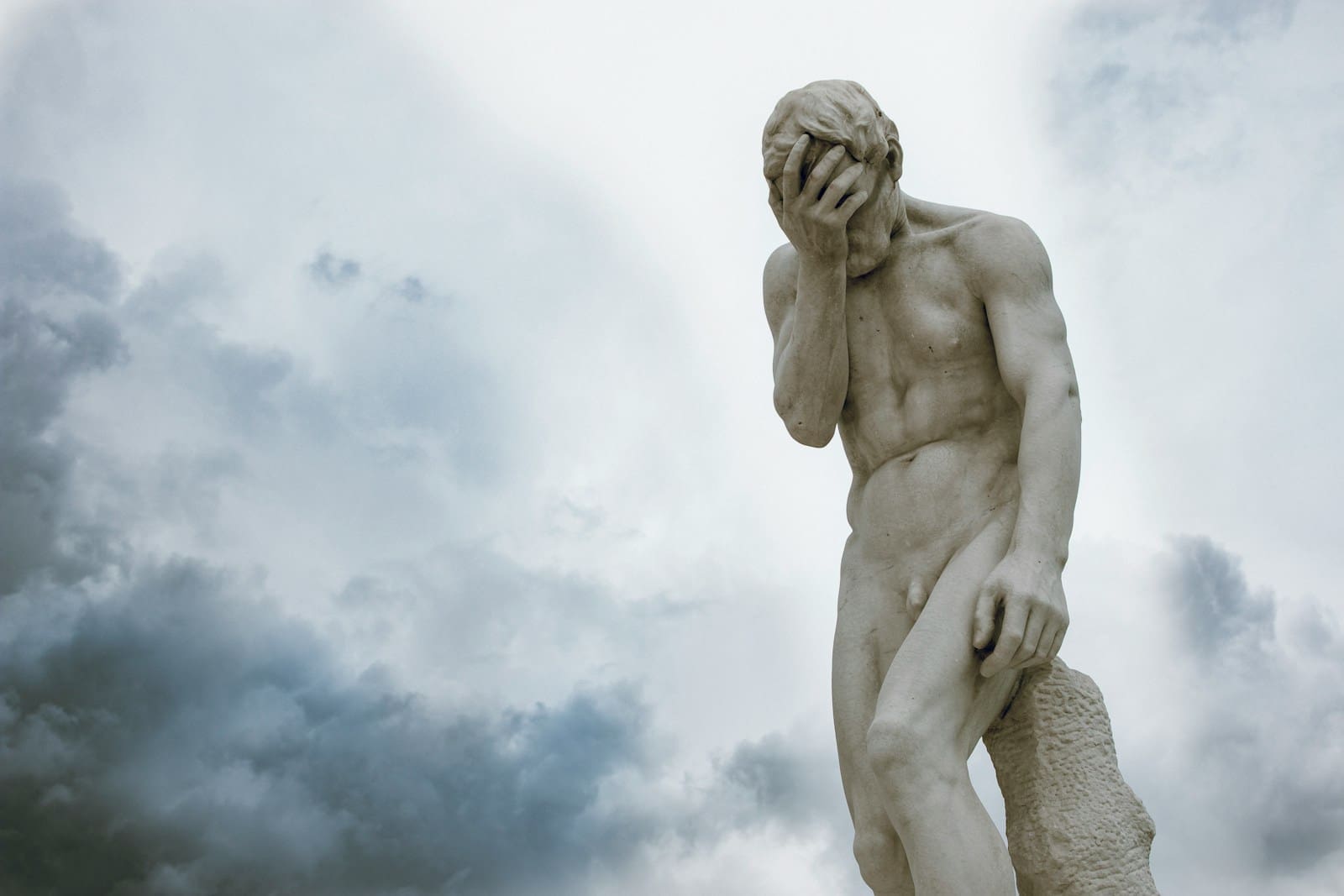
However, as we shall also see in other poetic compositions, one almost always gets the impression that Montale’s pessimism does not spring from a “universal,” “cosmic” awareness (in some ways similar to that often expressed by Giacomo Leopardi), but, on the contrary, it always possesses a gash. This incompleteness lets out what is opposed to the malaise. “The Prodigy of Divine Indifference” exists. The author knows of it, but it is like a precious painting protected by an indestructible and, at times, opaque glass case. He sees the contours of the shapes, but his hand, who knows, sometimes stretched toward it, always ends up bumping into the cold, impassible protective surface.
Being-in-the-world or rather ill-being
Man is condemned to be such, but at first glance, it might seem that such a condition is akin to that of a caged animal. Closer analysis shows a very different landscape. Man is aware of his malaise as he contrasts it theoretically with a corresponding positive. In other words, Montale (as well as any sensible man, for that matter) conceives of “well-being,” but if the malaise is overt, materialized in the hawk, or the impassibility of the statue in the center of a sunny square, well-being is ethereal, elusive, at times even indefinable. In such a condition, it reveals its terrible nature, sharper than a blade but as insubstantial as a cluster of clouds in a midsummer sky.

When nature concerts the nuances of malaise
One of Montale’s most famous poems, “Pale and Waning Sunset,” anticipates the themes that the poet would find again, amplified and multifaceted, during his artistic maturity. The context is the rural Ligurian landscape, compressed between the mountains and the sea, during a scorching summer month. Interestingly, the choice of settings often falls to desolate but “light-filled” locations. The early afternoon sun, for Montale, is by no means a pleasant companion to meditation or rest, a resource, therefore, benevolent, bestowing warmth and energy.
Summer: desert where echoes scream the human condition
Instead, it is an intrusive host that, by its very nature, transcends all boundaries, spreads out, penetrates the private, and dominates it. Without much hesitation, we can say Montale’s Sun is the most prominent representation of malaise, not because of its intrinsic nature but because of its existential condition. Then again, in the poet’s lyrics, we never find such Leopardi-like lines as “…for me, life is bad…” (i.e., part of the Italian poem, “Night Song of a Wandering Shepherd from Asia“).
For Montale, evil does not have such definite features, nor is it something one can too quickly complain about. Life is “bad” for every conscious man, to the point of commonly losing this attribute. Malaise is the most genuine way of realizing one’s human nature: there are no people who can escape this fate, except perhaps psychotics and newborn children.
Pale and waning sunset
by a scorching garden wall,
listening among the plums and barrens
to blackbirds snap and snakes rustle.
In the cracks of the soil or on the vetch
spying the rows of red ants
that now break and intertwine
at the top of tiny heaps.
Observing the distant throbbing
of sea scales among leaves
among leafy fronds
as trembling cicadas creak from bald woodpeckers.
And going toward the dazzling sun
feeling with sad wonder
what all life and its travail
is like in this following a wall
that has sharp bottle shards on top.
The poem is both a linguistic and musical capstone, the analysis of which would require an article in itself. Here, I will only highlight the points that emphasize man’s existential condition. Montale divides the composition into 3 + 1 stanzas, assigning the introductory and preparatory role to the first and, to the last, the synthesis of the entire poetic discourse. Malaise peeps out immediately, starting with the very successful choice of using the infinitive verbal tense (in the original version, every verse starts with the Italian for “to sunset,” “to listen,” and so forth). In the first three stanzas, we find “Sunset,” “Listening,” “Spying,” and “Observing” (that should be considered as verb tenses that are impersonal and lack temporal placement). Who takes charge of this?
Man as an icon of impersonality
The genius gimmick is precisely that of the search for impersonality. If malaise is man’s mode of being, any subject assignment is limiting. Moreover, infinity defines a kind of passivity-activity dichotomy: one neither “listens” nor “observes,” as this might lead one to think of an act of will, a deliberate choice. But this would give the subject too much control over his existential fate. Man unintentionally experiences the mode of being of observation. Unless one closes one’s eyes (faced with an expanse of blackness anyway) or is blind, he must (without any imposition on him) observe, listen, and spy, for they are but transient aspects of the world.

The preparation of the first three stanzas is based on bucolic descriptions, sounds, and images, all described through consonances and a careful choice of onomatopoeic terms. It all adds up to define that imperishable undercurrent destined to come back to life, like Sisyphus’ boulder at the foot of the mountain. Reading these verses does not assimilate to listening to the symphony Pastorale by Beethoven. In Montale, “the listener” pays no attention and does not follow the development of the motifs, the coming of an instrumental group, or the alternation of woodwinds and strings. In Montale, every image is introduced without will. Quoting a line from Fabrizio De Andrè, it is “…like smoke she penetrates every crevice…”
The malaise is multifaceted, but it has only one face.
Here, the evil of living returns in new guise, now as a cicada and a snake or ant. No matter what guise it may take. What makes it unique and invulnerable is precisely its passivity to human perception. It presents itself because no man could fail to welcome it, and even if one were to set such a goal, this choice would only conceal the transfiguration of Sisyphus’ effort. An attempt, according to Camus, to be made without delay, but which, alas, exists only and exclusively to fail.
Camus’ man in revolt becomes Montale’s man on the road.
The last stanza changes the rhythmic register from the infinitive to the gerund (in Italian, the difference is evident, but it’s harder to show in the translation). Also impersonal, cold, almost aseptic, but endowed with dynamism. The human being walks moves, and cannot stand still, for time is outside of it and can only be undergone. Like a musical composition, being-in-the-world unfolds in the flow of time and contrasts, to the stasis of seemingly impassive observation, the inevitable reality of metronome beats.
Existence is projected as the arrow of time defined in Thermodynamics, and the vanishing point, Giotto’s glory and curse, draws to itself to annihilate. In a dimensionless microcosm, man perhaps finds the crowning of his existence, but all this is an illusion, an asymptote. What can be seen is only the unstoppable motion toward a scratching sun, which radiates to the blind and, who knows, perhaps also to show extreme mercy to the man victimized by the world, finally depriving him of sight and thus making him safe from Sisyphus’ condemnation.
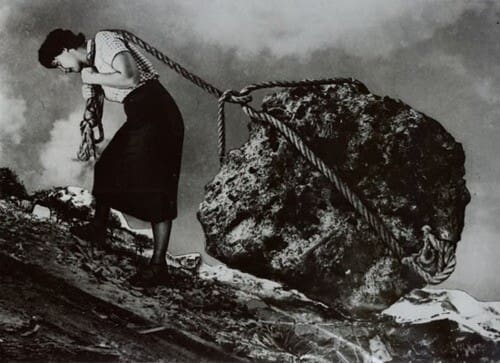
To be a man is to be alone
One might wonder if this path, this striving toward infinity (big or small), does not bring relief. It is a legitimate question and perhaps a hope lurking in every heart. Still, existentialism has taken it upon itself to answer that question, perhaps attracting the hatred of the most desperate. For Montale, the path is necessary, unstoppable, and lonely. No fellow sufferers exist, even though we know humanity lives in malaise.
This is perhaps the most shocking discovery, the terrible anathema uttered by a God victimized by his unitarian nature. Loneliness will have to accompany every human being, hold his hand, and, like a fierce tormentor, support him when his strength fails. One cannot not suffer, and one cannot not suffer in loneliness. A wall separates every man’s path but is more than a natural obstacle. It is man himself, by placing bottle shards (i.e., peasant technique to deter thieves) on it, masochistically, that makes the act of overriding, of breaking, even for a moment, this tremendous rule impossible.
Love and care, bastions of Heidegger, founder of Montale
What about love, the genuine longing for union with another? Can this be an escape route? According to Heidegger, caring (i.e., taking care) is the mode of being that best fits human nature, but how strong is that connection? What prerogatives can it have? The beautiful poem “House by the Sea” also answers such questions.
The journey ends here:
in the petty cares that divide the soul
that can no longer cry.
Now, the minutes are equal and fixed
as the pump wheel revolutions.
A turn: a rise of rumbling water.
Another, more water, at times, a squeak.
The journey ends at this beach
that assiduous, slow-moving streams attempt.
A sea textured by the lenient breaths
unveils nothing but lazy vapors: and rarely,
in the mute becalmed
among the islands of the migrating air,
the ridged Corsica or Capraia appear.
You ask if everything vanishes this way,
in this little fog of memories
Whether in the hour that twists
or in the sigh of the breaker, each destiny is fulfilled.
I'd like to tell you it doens't,
that the hour is approaching when you will pass beyond time;
maybe only those who want may be infinite,
and you can do, who knows, not me.
I think there's no salvation for most,
but everyone subverts any design,
passes the gateway, and finds what willed.
Before giving up,
I would like to mark this escape route
as labile as foam or wrinkle
of the subdued sea fields.
I also give you my miserly hope.
I don't know how to raise it to new days:
I offer it as a pledge to your fate; may it save you.
The path ends at these shores
that the tide rode with alternate motion.
Your heart near me that hear me not
already set sails, perhaps, for eterniny.
In describing a seascape, typically Ligurian, in which islands north of Sardinia appear, at least in memory, Montale reflects on love. In this lyric, it is not the snapping of blackbirds or lizards that mark the underlying rhythm of existence but the slow, faint, and grave regular motion of waves. Like a kettledrum in pianissimo, the “assiduous and slow flows” mimic the beat of a seemingly distant heart.
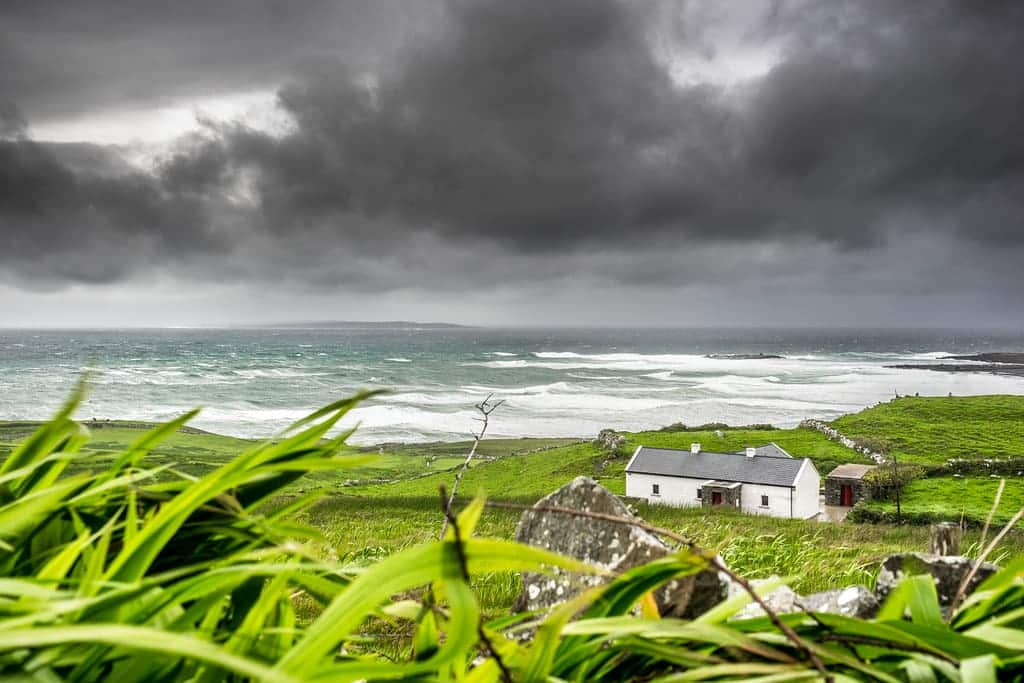
The poet seems alone, sitting on the beach, meditating. But this is only an illusion: there is an interlocutor, indistinct but recognizable in the archetype of the life partner – of one’s wife, in this case. It is, perhaps, precisely Drusilla Tanzi, Montale’s actual consort, whom the poet addresses with chilling sweetness. Not with dulcet words and sublime verses. Not with bright metaphors, as in the Song of Songs, but rather with a dry testamentary statement.
Montale and hope: between the will for transcendence and the claws of materialism
As in “Pale and Waning Sunset,” the poet glimpses infinity. As in a Lucio Fontana cut, he knows something must be there among the glowing embers that draw the path of existence. And perhaps, his very companion is the one who, more than anything else, reminds him of this image. But Montale is tired; his journey has been long and fruitless, so, in a beautiful act of love, he gives his hope to his woman so that Fate-an intentionally evanescent definition, rescues her and gives her what he has always yearned for.
But even this act, in its extraordinary essence, seems destined to fall into vain. Montale speaks, or, perhaps, just like the surf, he merely whispers, catching his breath between words. He desperately tries to break through that jagged wall with sharp pieces of glass. He does not care, who knows, about injuring himself or even dying; what matters most is to come to touch the hand of his beloved truly. But unfortunately, loneliness admits no exceptions; even in the ostensibly most intimate unions, deception and illusion lurk.
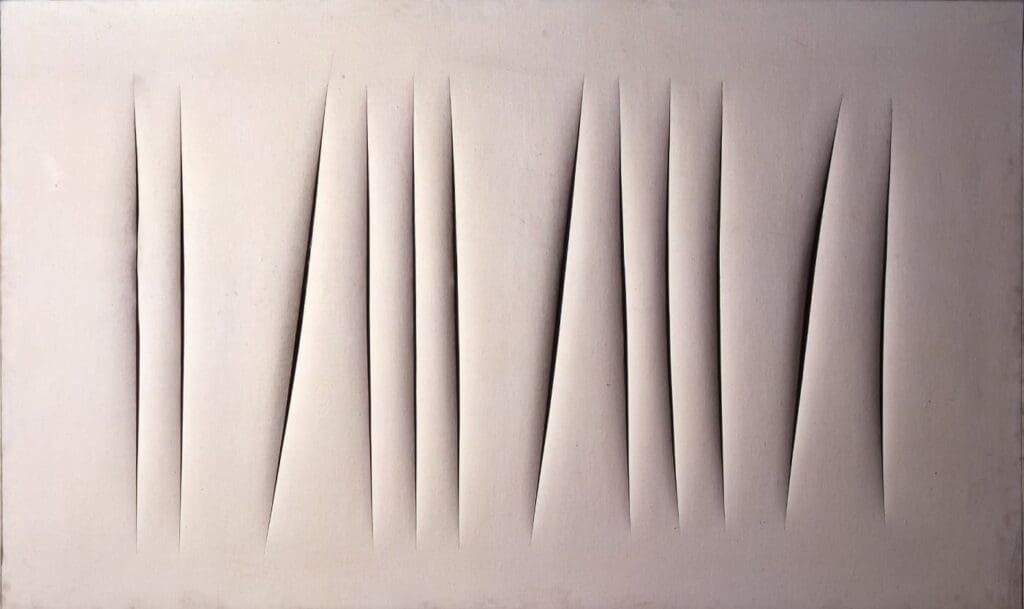
Drusilla is sitting next to him, but it is as if she is absent, for her actual presence is beyond the wall. And Montale knows this, describing with a kind of oxymoron his condition: “Your heart near me that hear me not.” It is not a matter of biological or even psychological deafness but of every man’s sort. The closeness is elusive even from the voice. So, in a burst of apparent optimism, he assumes that this much sought-after heart has finally discovered the “escape route” and, like a boat ready to set sail, is already moving, slow but inexorable, toward what only she, his life partner, knows no longer as a disembodied point of attraction, but as the real eternal, that infinity that Montale glimpsed between the folds of a spatial concept by Fontana.
Daring is permissible, but it is not allowed.
If he knows this gash and the infinity behind it without an excess of freedom, why does he not wish to communicate it? Montale accepts himself, although the appearance might be that he “simply” knows he cannot satisfy this common desire.
Don't ask us the word that squares on every side of our formless soul,
And in letters of fire declares it
And shines like a crocus
Lost amid a dusty meadow.
Ah, the man who goes safely away,
friend to others and himself,
and he doesn't care about his shadow that the heatwave
prints above a shabby wall!
Do not ask us for the formula that worlds can open to you
Yes, some crooked syllables and dry as a branch.
This is only what we can tell you today,
what we are not or what we don't want.
In the poem “Don’t Ask Us for the Word,” we find an answer to our question. The “word” or “formula” exists; otherwise, there would be no point in talking about it, but this does not imply that it is accessible or communicable. The impression one gets when reading this lyric is of a Montale on the stage prepared for a political rally of yesteryear, surrounded by a crowd of people waiting with their heads turned slightly upward.
The sun and the wall: companions for eternity
The poet is not afraid of disappointment or loss of popularity, and his answer is trance-like: do not ask, do not ask, for (this, perhaps, he only thinks) “I will not be able to answer you.” Perhaps some men claim this right, but having no instrument to subvert humankind’s existential reality, they turn their gaze to the crowd as they proclaim their truths. Still, they cannot take care of the shadow – the unequivocal evidence that the same sun of the “Pale and waning sunset” casts on the wall of their loneliness.
No formula can reveal the “falsity of truth.” Although the glimpses are multiplying like bacteria, it is increasingly possible to see that indistinct backdrop. Such worlds are foreclosed. Lacan would say they are beyond language and, therefore, impossible to manipulate with the tools at our disposal. It is, however, possible to utter a few “crooked syllables” to make a notoriously unsuccessful but still feasible attempt. Twist one’s lips to sneer a formless, dry, contentless verse. Like a squid bone, that’s all that can be said. Nothing else. The wall is too thick to let even a hiss escape, and its knowledge is more akin to the contortions of a hallucinated person than to notions dictated to a class of pupils.

The existence onto a sharp shard of a bottle
For now, I think it is time to stop. No discussion of Montale can be exhaustive: his poetry is so rich and topical that it engages every person, depending on different sensitivity levels. I wish to highlight (albeit limitedly) the existential approach of his artistic production, particularly some facets of his thinking, which are often branded with pessimism without providing the correct evaluation elements.
Montale could transform various philosophical contents collected in large volumes into a musical flow of verse, rhythms, images, sounds, and words. His poems do not take refuge in a frantic search for a courtly language but instead arise as if observation, introspection, and poetic technique were concatenated parts of a single creative process.
Human existence is always troubled, but seeking this unfavorable condition only within social contexts is risky. For Montale, man is, before anything else, the one who is destined to be such, the one who sees the sun, names it, invokes it (as God or simulacrum), but never and in no way will he be able to come to it, in a finally total communion, without falling mangled like a horse, blind and with bleeding hands. Even love, seemingly more solid and mighty than any capricious deity, is consumed in a dying beat that takes the place of every word, every smile, every possibility of sharing.
If you like this post, you can always donate to support my activity! One coffee is enough! And don’t forget to subscribe to my weekly newsletter!

